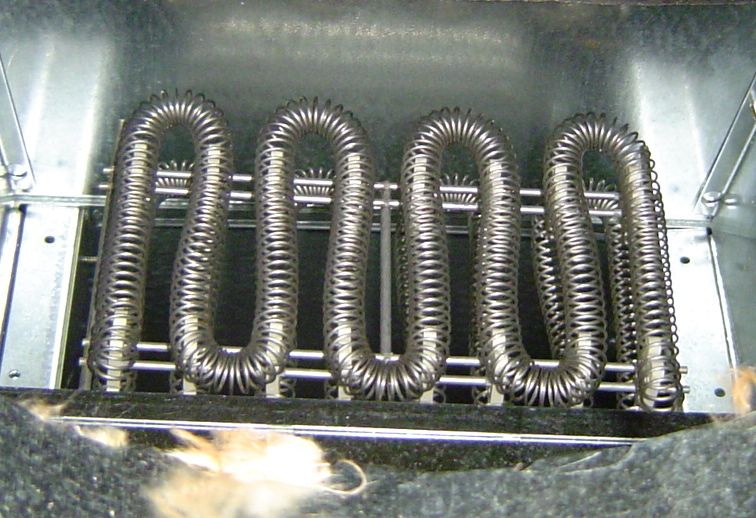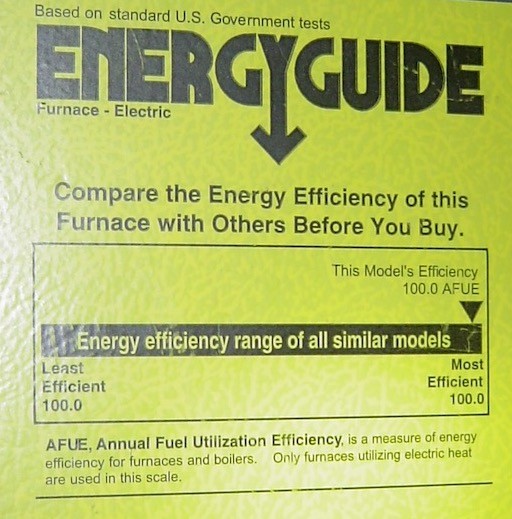When Is 100% Efficient Not Good Enough?

You can turn electricity into heat at an efficiency of 100%! Every kilowatt-hour of electricity in turns into one kilowatt-hour of heat out. That sounds pretty good, doesn’t it? The truth, however, is that electric resistance heat (toasters, baseboard heaters, and the auxiliary heat in many heat pumps) is about the least efficient way to get heat. Let me give you two examples.
Example #1: Some homes have what’s called an “electric furnace” for heat. If that’s your home’s heat source, you’re heating your home with a giant toaster. (The photo above shows what that “toaster” element looks like.)
When you look at the yellow Energy Guide label (sample below), it tells you that it’s 100% efficient. But when that strip heat kicks on, it takes a ridiculously high electric current. Go outside and look at your electric meter when it’s on, and it’ll probably be spinning fast enough to saw wood.

Now guess what the efficiency of a heat pump is. It’s in the range of 200 to 300%! That’s because a heat pump simply moves heat from one place to another. In the winter, it moves heat from outside to inside. (If moving heat from a cold place to a warm place seems strange to you, just think about your fridge. It does exactly the same thing.)
Example #2: An 80% efficient gas furnace. Believe it or not, 80% is better than 100% in this case. This time the answer relates to site versus source energy. That is, the electricity you use at home turns into heat at 100% efficiency, but the electricity was probably generated from burning coal or gas at around 30% efficiency. Yes, you turned 100% of your site energy into heat, but you only got 30% of the original energy from the fuel burned at the power plant.
So, if you burn the gas at home, you get heat at at 80% efficiency. If you burn that gas at the power plant, turn it into electricity, and then turn it back into heat, your overall efficiency is 30%. In this case then, even giving 110% wouldn’t be enough!
Allison A. Bailes III, PhD is a speaker, writer, building science consultant, and the founder of Energy Vanguard in Decatur, Georgia. He has a doctorate in physics and is the author of a popular book on building science. He also writes the Energy Vanguard Blog. For more updates, you can subscribe to our newsletter and follow him on LinkedIn.
Related Articles
A Surprisingly Common Cause for High Energy Bills
Heat Pumps, Auxiliary Heat, and Resilience
The #1 Reason to Have an All-Electric Home
What Happens to Your Used Electricity?
Comments are welcome and moderated. Your comment will not appear below until approved.
This Post Has 5 Comments
Comments are closed.

Very true, Steve. That’s why
Very true, Steve. That’s why the next time I get a chance to build a house, I’m going with ductless mini-split heat pumps. I won’t have any duct leakage if I don’t have any ducts!
Hi Allison,
Hi Allison,
Have you done any study of the efficiency of micro-CHP? It likewise attempts to boost efficiency by effectively transferring source energy to site energy (of course, that’s my paraphrasing – hope I’m not driving you nuts with it! 🙂 But the gear itself is very expensive. Was just wondering. Thanks!
How do I know if I am using
How do I know if I am using supplemental heat with my heat pump.We have a 14 seer heat pump system with 80,000 btu propane F/A furnace. We have had minus 0 Degree Fahrenheit temperatures. Is is more efficient to run just the propane furnace and not pay extra hydro to run the heat pump on these cold, cold days.?
Ran into a house last week
Ran into a house last week that had a gas stove and an electric furnace in the attic, built 2010. Didn’t quite understand what the builder had in mind on that one…
When our heat pump is on
When our heat pump is on supplementary heat how many BTUs are produced for each KWH of electricity?